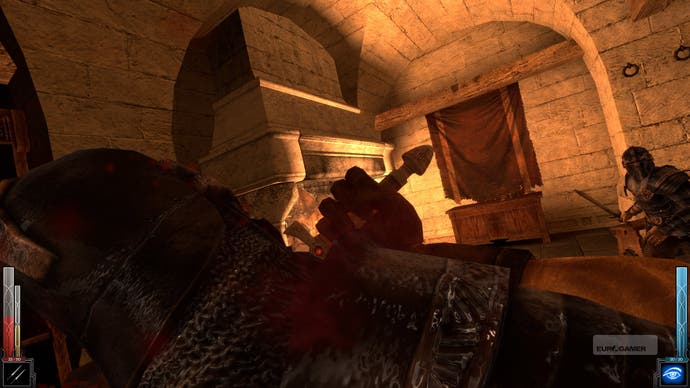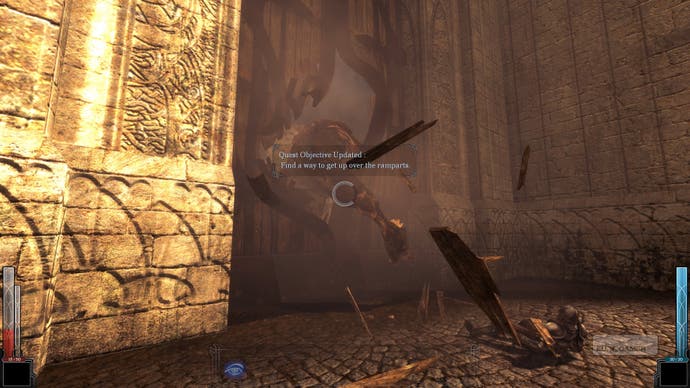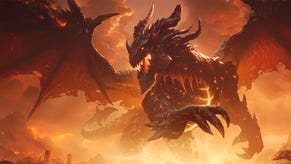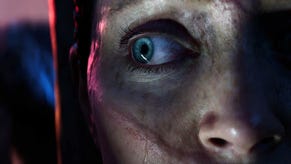Retrospective: Dark Messiah of Might and Magic
Boot to kill.
Consider the Boot. The Stalwart Companion of the Road. The Silent Sufferer of the Inevitable Sewer Level. Courageous Clinger of Ladder Rungs. Stoic, Sodden when Submerged. And yet, despite all these admirable feats, the Gracious Boot doesn't often get much of a look-in in games. Often, in fact, it won't even be rendered, its hard work all but ignored when you look downwards, only to find empty air between you and the floor.
Dark Messiah of Might and Magic is a game that gave the Boot a little fun. It's always present, either to look at or, more importantly, to slam into the faces/stomachs/groins of anyone and anything that stands between you and the Shantiri Crystal. It's a vital tool in your arsenal, there to create a little space whenever you need it, when there are too many evil men clustering around you. Thwack - and you've got a moment to breathe.
Although it's not always about space. More often than not, it's about kicking to somewhere, rather than from yourself. Into a flimsy support beam, causing a cascade of precariously stacked boxes to crush the poor sod you just booted. Into one of the many, many, dangerously placed spiked grids that serve... some purpose. Kick, stumble, skewer. Or, as is perhaps more often the case, kicked into the great abyss, kicked off a cliff, kicked down a staircase, or over a balcony. Any and all prepositions can apply to the Mighty Versatility of the Boot.
Once you understand this basic connection between man and foot, foot and enemy man, you can start to understand why Dark Messiah of Might and Magic is quite such an enjoyable game. It's about placing you in the world, rather than just being a hovering gun that points at things that it wishes dead. Your boot is your connection to the world of Might and Magic, but it's merely an implement; the effects you can bring about are where the meat of the experience lies.

Released in 2008 by Arkane Studios, of Arx Fatalis and the upcoming Dishonored, Dark Messiah was made in Source, Half-Life 2's engine. The similarities between them, few as they are, dwell in the strength of Source: its physics. Importantly, though, rather than go down the route of Half-Life 2's physics puzzles, Arkane made a game shot through with that physicality, permeating the entire game world. Things that you'd expect to react to a bunch of medieval fantasy dudes duking it out do react to a bunch of medieval fantasy dudes duking it out.
Attic floors, constructed of half-rotten wooden planks placed down by some cowboy carpenter, splinter and snap when put under the pressure of a lobbed crate, taking the three guards you really didn't want to have to deal with down to a sticky end on the floor below. A chandelier swings wildly out of control when you cut the rope that was so courageously holding it back. Men get crushed, all the bloody time, because you're just the kind of curious sadist that Arkane made the game for.
More importantly, these tactics are all but required if you don't want to die constantly. Dark Messiah treads the tricky line of empowering you without ever making you feel superhuman. Your opponents don't have noticeably less health than you, and there's rarely a time when you'll be facing them one at a time.

Instead, you need to stack the deck against them, coupling your inherent skills with a keen observation of the surrounding environment. Figuring out where you want to fight is almost as important as how; if you lure them over to this suspiciously spiked vine-frame, you can kick one of them into it, killing him instantly, while you dispatch the other. Or perhaps you can get them dangerously close to the campfire and set them alight with a well placed Boot-to-Groin.
Of course, so many environmental hazards are suspect. While a certain amount of them can be argued away as shoddy workmanship and an evil necromancer's penchant for anything with metal spikes on it, it's not long before the constant placements in every single combat arena start to get a little bewildering. The counter to that is, of course, that kicking evil guys into these things never stops being fun. It's a novelty, really, but it's not one that outstays its welcome for the eight or so hours of Dark Messiah's single-player.







.png?width=291&height=164&fit=crop&quality=80&format=jpg&auto=webp)
